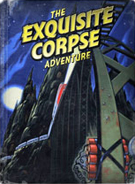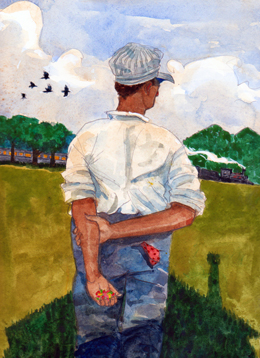The Exquisite Corpse Adventure
Episode 22
![]() Hear it (MP3) 10:50
Hear it (MP3) 10:50
Contributed by: Lemony Snicket
Illustration by: James Ransome
Episode 22
Meanwhile, Near a Meadow
By Lemony Snicket
It is one of the sad truths of the world that while some people are enjoying sour gummy bears, others might be in circumstances less delicious, such as finding themselves trapped at the bottom of a well with their clothes all muddied, or pursued by hounds across the estate of a mad duchess, or finding out that their parents had only raised them for their long, silken hair, and now that it had grown long enough to be made into a blanket they would surely be slaughtered, or even sitting in a small tin shack listening to the cawing of ravens and the distant chatter of relieved train passengers.
This last activity was Pirandello’s.
Pirandello was a young man prone to melancholy, probably due to his occupation, which kept him far from anyplace where sour gummy bears could be found. He was in charge of railway safety in a remote location bordered by woods and mountains, which he had thought would be a very exciting job, involving danger and adventure. Instead, not a single train passing through Pirandello’s region had experienced even the smallest accident. No rabid ravens had leapt through the train’s window to bite and infect an innocent group of monks traveling through the area. Not one inch of track had been washed out in a hailstorm, leading to the evacuation of frightened flight attendants on their day off. And not a single lock on a single door of a single cargo car had broken, causing the contents to spill out over the countryside. Pirandello had many fantasies of what might spill out during such an accident - cuckoo clocks, perhaps, chirping their way down the steep embankment, or a shipment of abandoned rollercoaster parts that Pirandello might have fashioned into a go-cart allowing him to whoosh his way through his surroundings. And, of course, Pirandello dreamed of delicious foodstuffs that might topple out of a railway accident. Working out in the boondocks meant he was limited to eating nuts, berries and the occasional fish he could lure out of a nearby brook, and Pirandello would have appreciated something that couldn’t be found in the wild, such as sour gummy bears, a phrase which here means “sugar and chemicals shaped vaguely like bears.” But it seemed that the world’s sour gummy bears were being devoured by people far away from him - total strangers, whom he might never meet.
Thus, last night’s train accident was good news for Pirandello.
It was still not very clear to Pirandello the cause of the accident. He had been sleeping in the small tin shack’s large lumpy cot when the sound of squealing breaks, followed by screaming, followed by a muted explosion, woke him up. By the time he’d put his railway safety bathrobe on over his pajamas, the forest was full of passengers from the stopped train climbing down a makeshift ladder and fleeing the scene of the accident. Some of them were frightened. Some of them were angry. And some of them felt nothing but weary resignation, a phrase which here means “the sense that they were only minor characters in some large, confusing story where the heroes were far away stuffing themselves with sweets.” Pirandello managed to talk to a few of the passengers but could not quite understand what had happened. They mentioned two children. They mentioned a bomb. They mentioned a clown. But as they were not the heroes of this story, the passengers were unable to recount what exactly had occurred on board the train, and were as baffled and disappointed as Pirandello himself, stumbling around the woods with his official, dimming flashlight.
If any readers are similarly confused, they might reread the first chapter of this long, confusing story.
As it was so late at night and such a remote location, most of the passengers took shelter in the woods, and when he returned to his shack Pirandello could see the distant lights of campfires and could hear the passengers talking to one another and sharing refreshments. The refreshments were likely delicious, and far more interesting than Pirandello’s usual scavenged diet, but no one thought to offer anything to the melancholy man in charge of railway safety. Soon Pirandello heard the tuning of a guitar, and then a passenger began to sing, and then another, and soon a whole group, and before long the forest was full of the sounds of singing. It was a happy song, but still the chorus in the night made Pirandello feel even more melancholy than ever.
The song was “The Surrey with the Fringe on Top,” which he had never liked.
Finally the passengers quieted and before long the air was filled with the sound of ravens welcoming the dawn, and Pirandello sighed and listened to the passengers packing their things for the long hike back to where they lived. After so long, finally something interesting had happened to him, and yet he felt thwarted, a word which here means “like he had missed his opportunity to do or find something crucial to the story.”
A knock on the tin door brought him out of his thoughts. “Yes?” he called.
“Are you the person in charge of railway safety?” asked a bright voice.
“Yes,” Pirandello said, and opened the door. There stood a tall, strong-looking girl with hair so short she was practically bald.
“Thank goodness,” she said. “There’s something I need you to see.”
“Pirandello, at your service,” he replied, which is something he’d always wanted to say. “My name is Orlando,” said the tall girl. “Come this way.”
Pirandello followed her along a narrow path he had made himself, that led to a wide, open meadow full of bristly grass. In the distance he could see small groups of passengers beginning their trek back to civilization. “I was on the train that stopped,” Orlando explained, “and I’ve been helping some of the passengers find their belongings. The sudden stop tossed a number of items into this meadow.”
“Aren’t you going back with the others?” Pirandello asked.
The girl sighed. “There’s nothing back there for me,” she said. “I learned just yesterday that my parents had been raising me just for my long, silken hair.”
“I don’t mean to contradict you,” Pirandello said, “but you hardly have any hair at all.”
“It’s being used to weave a blanket,” Orlando said sadly, running her hair through her stubble. “My parents cut it off with a long, sharp knife, which they then planned on using to cut my life short.”
“That’s dreadful,” Pirandello said. “Dreadful and shocking.”
“Dreadful and shocking and wasteful,” Orlando replied. “After all, my hair will grow out again, and they could use it to make another blanket. In any case, I managed to escape them by jumping out the window. I ran right to the train station and boarded the first train that arrived. I had no idea where I was going, but now it seems I’ve gone here, to this forest. It’s not bad here, actually. It’s very peaceful.”
“It is peaceful,” Pirandello agreed, “although the food can get a little monotonous.”
“Well, perhaps we’re in luck,” Orlando said. “At the far end of the meadow are three unclaimed objects from the train accident. I thought someone from railway safety should know about them. The first is an enormous sack of sour gummy bears.”
“Egad!” Pirandello said. “I never thought such an item would end up here in the forest!”
“I know what you mean,” Orlando said. “All my life I’ve felt like a tiny, minor character in a much larger and confusing story. I assumed that the treats in such a story would end up in the mouths of the heroes, not minor characters such as myself.”
“Maybe we’re not such minor characters after all,” said Pirandello. “What are the two other unclaimed items?”
“See for yourself,” Orlando said, for by now they were at the edge of the meadow, and Pirandello saw for himself. The first item was a large slab of wood, lying flat on the grass where it had fallen. The wood was polished to a shine that caught the morning sun and was no doubt confusing some of the cawing ravens. Toward one of its edges was a round silver knob. Pirandello had to look at the object for quite some time before he could tell what it was.
“It’s a door!” he said.
“Precisely,” she said. “It doesn’t appear to have been part of the train, as there’s no indication it was ripped off during the accident. It’s just a door. Who on earth would be looking for a door?”
Pirandello did not know the answer to this question, but even if he did, he wouldn’t have answered, because the third and last unclaimed item in the meadow was so strange that he simply stood and stared for quite some time, and the eerie object stared back. After all his melancholy time alone in the forest, feeling like a minor character in someone else’s story, Pirandello began to feel like he might not be alone, not with his new friend Orlando, and that he might not be a minor character, now that this item, which surely must have been as important as it was strange, had come into his possession.
It was, of course, a head.
Audio recordings provided by National Library Service for the Blind and Physically Handicapped


The National Children's Book and Literacy Alliance and the Butler Center for Children's Literature at Dominican University have developed a companion educational resource center (external link) to support “The Exquisite Corpse Adventure.”

